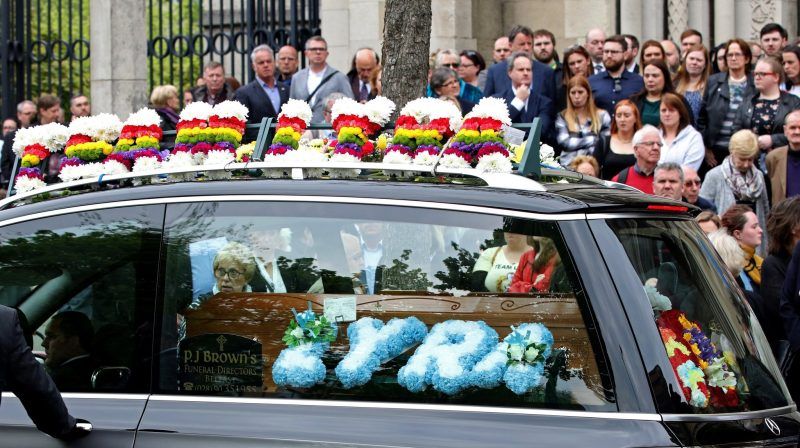
Kevin Barry O’Donnell told me that he and his friends wanted the Troubles to come back. “The madness, the riots, the shooting, the bombings, everything,” he said of the 30 years of conflict between mostly Catholic republicans who wanted to reunite Northern Ireland with the Republic of Ireland and the mostly Protestant unionists who wanted it to remain a part of the United Kingdom.
I was interviewing Mr. O’Donnell in 2017 for a film I was making about life after the Troubles. He was 16 years old and living in Derry, the city in Northern Ireland that was famous as both the site of the conflict’s beginning and one of its worst atrocities, the killing of 14 Catholics by British soldiers in 1972 in an event known as Bloody Sunday.
Mr. O’Donnell remembered none of it. The Troubles officially ended in 1998 with the signing of the Good Friday Agreement — before he was born. But he expressed a potent nostalgia.
Twenty-one years later, it seems as if the madness has returned. Last week, Lyra McKee, a brilliant 29-year-old journalist, was shot dead during an anti-police riot in Derry. Mr. O’Donnell had dismissed paramilitaries to me as “hoods with guns,” but like him, many of the rioters were teenagers born after the 1998 agreement.
A group of dissident republicans who refused to support the Good Friday Agreement, the New Irish Republican Army, accepted responsibility for the killing in a statement on Tuesday. Ms. McKee’s killing was the latest violent incident in Derry associated with such dissidents. Four men have been shot there “by appointment” since February. A car bomb exploded outside a courthouse in January. Last month, dissident republicans claimed responsibility for three “suspicious” devices sent to addresses in Britain.
Ms. McKee’s killing is a terrible loss for Northern Ireland. One tragic irony is that she was one of the few to articulate the frustrations of the generation that came of age after the Troubles. “We were the Good Friday Agreement generation, destined to never witness the horrors of war but to reap the spoils of peace,” she wrote in 2016 when statistics revealed that more people had died by suicide in Northern Ireland than were killed during the conflict. “The spoils just never seemed to reach us.”
The headlines have gone away, but violence has continued at a low level. Symptoms akin to post-traumatic stress disorder were undiagnosed, and the effects were passed to younger generations. Drug abuse, alcoholism and suicide are common. Derry ranked last in a 2017 report on the economic health of 57 cities across the United Kingdom. When I spent time there, it seemed as if some people were almost addicted to conflict. Small grievances could escalate into shooting. Even rumors of an insult could lead to retaliatory measures that would continue until the original unproven charge had then been forgotten. There was a genuine confusion between what was real and what was posturing.
An entire alternative justice system has persisted for some in Northern Ireland — Catholics who don’t recognize the authority of the police, the courts or the government of the United Kingdom. When Kevin Barry O’Donnell’s older brother, Philly, was accused of dealing drugs, their mother was ordered to bring Philly to be shot by dissident republican gunmen as punishment. There was no question of calling the police.
President Bill Clinton, who helped broker the Good Friday Agreement, anticipated some of this. In a 1999 phone call with Prime Minister Tony Blair, Mr. Clinton tried to warn his British counterpart about the fate of the men of Northern Ireland. “You’re asking them to put a little white bread sandwich in a lunchbox and go off to work at the factory,” Mr. Clinton said. “It’ll be hard for them.” Mr. Blair responded that he had “put some people to work on” the issue.
But it doesn’t seem as if many people did “go to work” on healing Northern Ireland. Two-thirds of children in Creggan, a heavily Catholic housing estate on the edge of Derry, are born into poverty. Somewhere along the way it was forgotten that both veterans of the Troubles and their children might crave the status and purpose the conflict provided. The news crews and big-name politicians lost interest, and these neighborhoods were allowed to fester. The radicalization of young men is unsurprising.
The “peace process” was the term used to describe the series of talks and concessions between opposing sides that led to the first I.R.A. cease-fire in Northern Ireland in 1994. But since the Good Friday Agreement, the idea of “process” has been forgotten. The rest of Britain — and the world — seems to think of Northern Ireland as a place that is either at peace or at war. The fears that war could break out again are unfounded; it’s just that the peace has always been violent.
The reality is that Northern Ireland exists in a precarious post-conflict state. It is a place of both pain and of recovery. It cannot be abandoned by Britain or the rest of the world. The politicians of the United Kingdom and Northern Ireland must lead, and we all must pay more attention to these communities. The stakes are too high, as the killing of Ms. McKee shows. Wars take a long time to end, and peace is a process that must be protected.
Sinead O’Shea is the writer and director of the film A Mother Brings Her Son to Be Shot.
